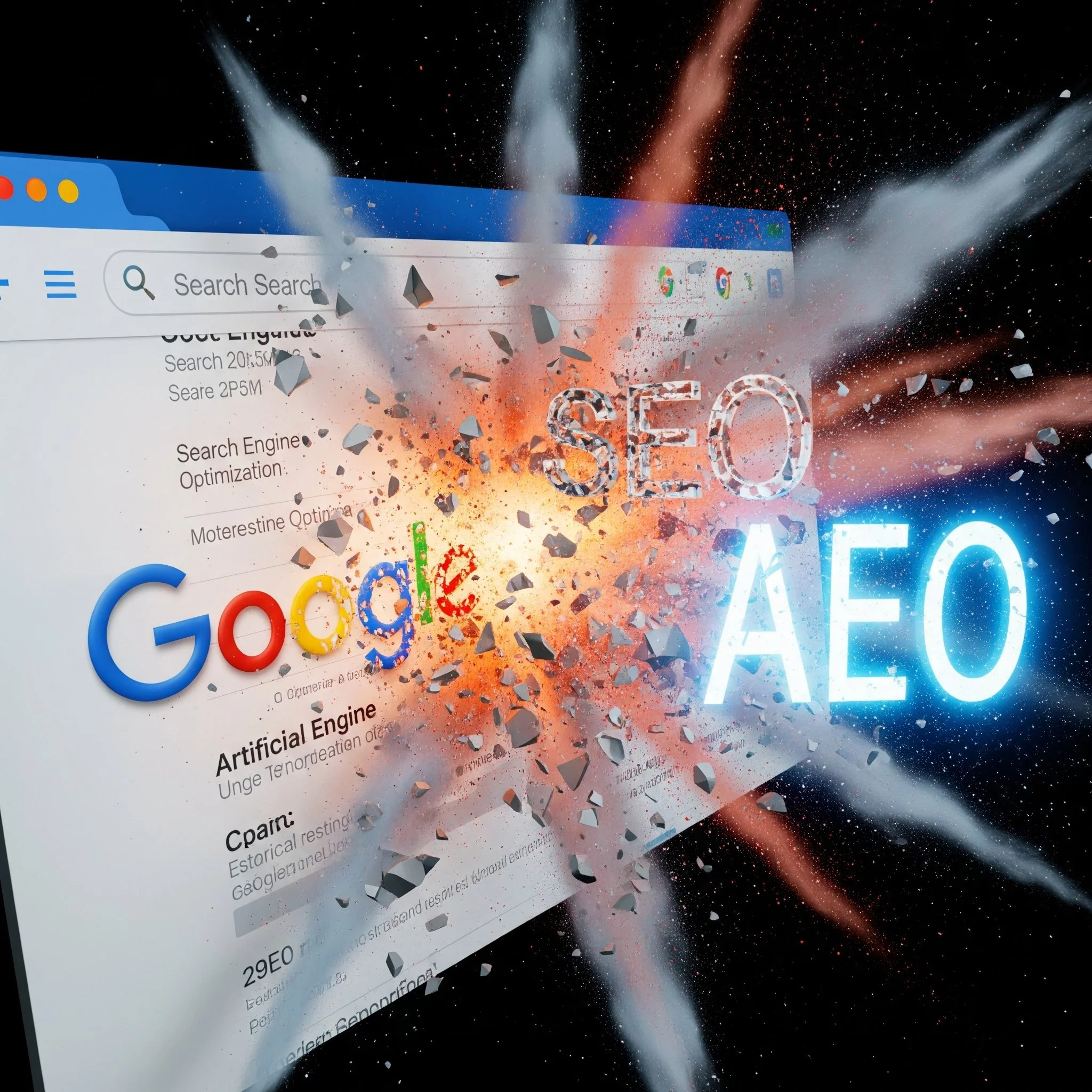The SEO Collapse: What Podcasters Need to Do Right Now
Search isn’t just evolving. It’s being dismantled. Your traffic is being rerouted and it’s happening right now.
If you’re a podcaster, your discoverability is on the chopping block.
This isn’t a cosmetic change. It’s the great Google reset.
You know the familiar experience of typing a query into Google and getting a clean list of 10 blue links? That’s going away. Fast.
Instead, we’re getting AI-generated answers, floating summaries, voice results, and zero-click interfaces that answer questions without sending users to your content. No more guaranteed links. No more free clicks. No more automatic discovery.
If your podcast episode pages aren’t getting as much traction, or your blog posts aren’t driving the same traffic, it’s not just you. The decline is from a structural shift that’s breaking the foundations of traditional SEO. For podcasters trying to get discovered, that shift changes everything.
What’s Actually Happening
Search as we knew it is changing. The traditional playbook of ranking high on Google, appearing in keyword results, and driving clicks to your website is being replaced by AI-generated summaries and voice-based answers. Many have tiny links to the original source or no link at all.
It’s called Answer Engine Optimization (AEO), and it’s altering how content gets surfaced and consumed.
Here is a telling stat: According to SimilarWeb, 69% of Google searches in the U.S. now end without a click. That’s up 13 points in one year.
Tech analyst Shelly Palmer recently wrote about this transformation from SEO to AEO. Neil Patel, arguably one of the smartest voices in search, has also been sounding the alarm. The big takeaway is we’re no longer optimizing for search engines. We’re optimizing for answer engines.
What AEO Means for Podcasters
Most people don’t discover podcasts by landing on a website and clicking play. They find new shows through friends, social media, algorithms, and increasingly, AI tools that answer questions instead of serving up links.
That means your show’s visibility depends less on clever SEO tricks and more on how answerable your content is.
If your show notes are an afterthought, or worse, if you skip transcripts, you’re not just missing accessibility opportunities. You’re opting out of the next wave of discovery.
Here’s the good news: AI favors clarity, structure, and intent. And podcasters, more than most, know how to tell a great story.
Now it’s about formatting that story so AI can understand and elevate it.
If your content is structured, summarized, and AI-readable, you’re ahead of the curve. If not, it’s time to adapt.
Your Transcript Is Now Your Most Valuable Asset
Transcripts are the new front door to your podcast.
If you want your content to show up in AI-driven search, your transcript must:
· Exist (yes, many podcasts still skip this)
· Be clear and easy to scan
· Be formatted for AI comprehension
AI tools can’t (yet) listen to your episode and fully grasp its meaning. But they can read a transcript. A transcript with clear speaker labels, logical segments, and highlighted key takeaways is:
· AI-indexable
· Quote-worthy
· Discoverable in new ways
5 Things Smart Podcasters Should Do Right Now
Here’s how to stay visible in the age of answer engines.
1. Structure Your Show with Intent
In episode planning and execution, start strong with a question or bold insight. Don’t bury the lede. AI tools prioritize crisp, answerable content that is easy to quote.
2. Publish a Clean Transcript
Make it skimmable. Use speaker labels and break it into readable chunks. Treat your transcript like a blog post.
3. Add Bullet Summaries and FAQs
Include a TL;DR section or key takeaways section. It helps AI instantly grasp the value of your episode. Bonus: humans like them too.
4. Use Chapters and Segment Your Video
If you publish video podcasts, YouTube is your second front door. Add chapters with clear titles and repackage key moments for TikTok, Reels, or YouTube Shorts.
5. Optimize Your RSS, Metadata, and Titles
AI and search engines rely on structured, clear metadata. Tags matter less now, but episode titles and descriptions carry more weight than ever. Make them descriptive and specific. Avoid generic titles. They will get crushed.
You’re No Longer Fighting for a Top Spot. You’re Fighting to Be the Answer.
The SEO collapse isn’t just another tech cycle. It’s a rewriting of the rules of digital discoverability.
The audience is listening and watching. The machines are reading. Let’s make sure they both know where to find you.
Recently I hosted a webinar about the opportunity for local podcasts, and video podcasts with Borrell Associate’s CEO Gordon Borrell. Our special guest was Stephanie Chan from YouTube. You can watch a replay here.
We know many people share this newsletter . If The Thought Letter was passed to you from a friend or business associate, please take a moment and subscribe for free, here.

